5 Ways SLPs Can Support Friendships for People who Use AAC
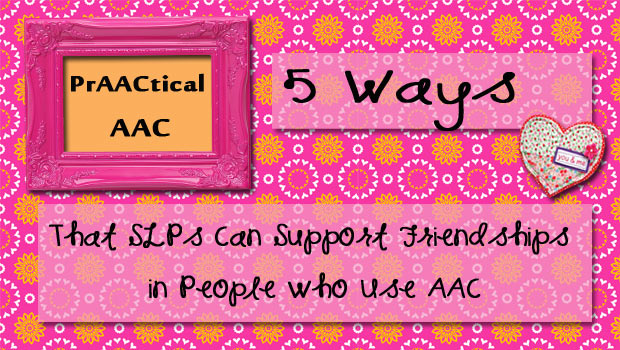
No feeling person could read Louise Kinross‘s post, My Child’s Dream: To Have Friends, without being moved. One of the most basic fervent wishes that all parents have is for their sons and daughters to make and keep friends. Disabled or not, parents fear loneliness for their kids, and rightfully so. Loneliness is a sharp and lasting pain. And, in many cases, completely unnecessary. Kinross’s post, brought to my attention by Ellen Seidman of (Love that Max), inspired me to generate this list of things that we SLP’s can and should be doing to support kids and families.
is
1. Make friendship skills a priority: Are there friendship goals in the IEP? There could be. If you’re thinking about working on a social skill, take a step back and see if it makes sense to focus more specifically on communication skills in the context of making and keeping friends. Educationally relevant? You bet. Does anyone seriously think that forming relationships with our peers is less important that knowing the Scientific Method or knowing state capitals?
–
2. Teach peers what to do: Kids without disabilities may want to become friends with a classmate or neighbor who uses AAC, but might hold back because they just don’t know what to say or do. Embrace them into your therapy sessions or collaborative visits to the classroom by teaching them what to do. A little guidance and leadership from you can bring down those barriers. Stick around to do a little coaching (if needed), but then fade into the woodwork. Friendships develop better without us grown-ups hovering around trying to make things perfect. (It’s not therapy. It’s a budding friendship.)
–
3. Make sure the AAC system has the right kind of vocabulary and messages: No one wants to hang out with someone who communicates primarily to get what they want. Think: comments, questions, and short narratives. Ask yourself: What would these kids say if they could both talk? Eavesdrop: What are kids of that age and gender talking about? What words are ‘in’? Keep your ears tuned into what’s going on between friends. You’ll come away with some good -ideas for vocabulary and messages.
–
4. Teach and practice social interactions: A lot of the language skill we’re teaching could easily be taught in the context of a social exchange. Think: core language practice, scripts, video modelling. Why use a workbook or file folder game/activity when you can build the language in a fashion that translates to a conversational exchange with a peer?
–
5. Read about supportive strategies. Who dares to teach must not cease to learn, John Dana told us. Some suggestions:
- Strategies to Support the Development of Positive Social Relationships and Friendships for Students Who Use AAC by Pam Hunt, Kathy Doering, Julie Maier, & Emily Mintz in Practically Speaking: Language, Literacy, and Academic Development for Students with AAC Needs (Edited by Gloria Soto, Ph.D., & Carole Zangari, Ph.D.)
- Using AAC Technologies to Build Social Interaction with Young Children with Autism Spectrum Disorders by Kathryn Drager, Janice Light, Erinn Finke in Autism Spectrum Disorders and AAC (Edited by Pat Mirenda, Ph.D., & Teresa Iacono, Ph.D.)
- Activity Brings Community into Our Lives: Recreation, Leisure, and Community Participation for Individuals Who Use AAC by John Dattilo, Elizabeth Benedek-Wood, & Lateef McLeod in Transition Strategies for Adolescents and Young Adults Who Use AAC (Edited by David McNaughton, Ph.D., & David Beukelman, Ph.D.)
–No more lonely kids. C’mon SLPs: We can do this. We have to.
–
Filed under: PrAACtical Thinking
Tagged With: friendship, partner training, social skills
This post was written by Carole Zangari

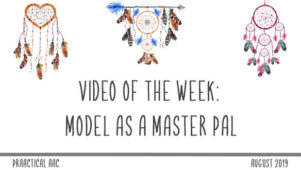
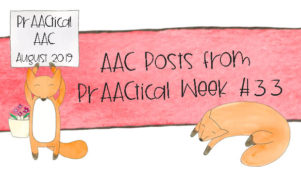
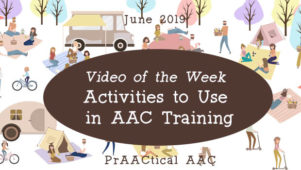
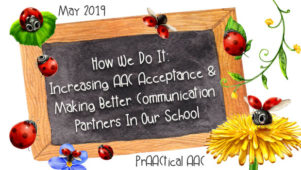
2 Comments
Thank you for a beautiful and thoughtful post. I suggest Rebecca Beayni’s site at http://www.rebeccabeayni.com/portfolio.html as another example of how to help build community in the lives of people with communication challenges.
Thanks for your kind words and for that suggestion, David. I am not familiar with Rebecca’s site and look forward to checking it out. This is an area where we SLPs could have so much impact if we made a concerted effort to address it. Everyone, everywhere has experienced loneliness or has witnessed the detrimental impact it has had on someone else. Especially in the wake of the tragic events in Newtown, we have to see ourselves as professionals who intervene to help people connect with one another. SLP is not just the mechanics of communication. We have to keep our eyes on the prize and your comment gave me an opportunity to reflect on how important it is that we find better ways to address this topic.